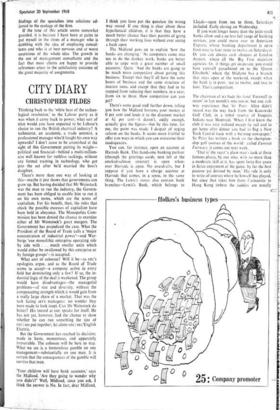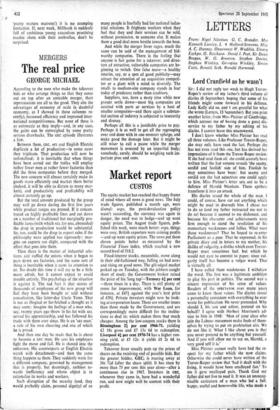CITY DIARY
CHRISTOPHER FILDES
Thinking back to the 'white heat of the techno- logical revolution,' to the Labour party as it was when it came back to power, what sort of nian would you have expected to be Labour's choice to run the British electrical industry? A technocrat, an academic, a trade unionist, a professional manager who'd fought his own way political and financial—behind a multi-million- aire well known for ruthless sackings, without any formal training in technology, who, got into the act after he'd married the boss's daughter.
There's more than one way of looking at this—maybe it just shows that governments can grow up. But having decided that Mr Weinstock was the man to run the industry, the Govern- ment has been obliged to enable him to run it on his own terms, which are the terms of capitalism. For his benefit, then, the rules that check the possible excesses of capitalism have been held in abeyance. The Monopolies Com- mission has been denied the chance to examine either of Mr Weinstock's great mergers. The Government has prejudiced the case. What the President of the Board of Trade calls a 'major concentration of industrial power'—and War- burgs 'one monolithic enterprise operating side by side with . . . much smaller units which would either be swallowed by this enterprise or by foreign groups'—is accepted.
What sort of colossus? Will it be—as GEC'S apologists argue, and as the Board of Trade
seems to accept—a company active in every field but dominating only a few? If so, the in- dustrial logic of the deal is weakened. The group would have disadvantages—the managerial problems—of size and diversity, without the compensating strength which it would gain from a really large share of a market. That was the
task facing AEI'S managers: no wonder they were made to look inept. Can Mr Weinstock do better? His record at GEC speaks for itself. He has not yet, however, had the chance to show whether he can run something the size of GEC/AEI put together; let alone cEciam/English Electric.
But the Government has reached its decision; made in haste, momentous, and apparently irreversible. The colossus will be here to stay. What we see is a tremendous gamble on one management—substantially on one man. It is certain that the consequences of the gamble will survive that man.
'Your children will have bank accounts,' says • the Midland. 'Are they going to wonder why you didn't?' Well, Midland, since you .ask, I think the answer is No. In fact, dear Midland, I think you have put the question the wrong way round. If one thing is clear about these hypothetical children, it is that they have a much better chance than their parents of going through their working lives without ever seeing a bank open.
The Midland goes on to explain 'how the banks are changing.' As computers come into use to do the donkey work, banks are better able to cope with a great number of small accounts.' Quite. 'And the banks are going to be much more competitive about getting this business.' Except that they'll all have the same hours of business and the same structure of interest rates, and except that they had to be stopped from reducing their numbers, in a year, from six to three. How competitive can you get?
There's some good stuff further down, telling you how the Midland borrows your money at 0 per cent and lends it to the discount market at 6.1 per cent—it doesn't, oddly enough, actually give the figures—but by this time, for -me, the point was made. I despair of urging reform on the banks. It seems more fruitful to offer you ways in which you can overcome their inadequacies.
You can, for instance, open an account at Harrods Bank. This handsome banking parlour (through the greetings cards, turn left at the smoked-salmon counter) is open when- ever Harrods is open. No overdrafts, but I suppose if you have a charge account at Harrods that comes, in a sense, to the same thing. The Lewis's stores also contain bank branches—Lewis's Bank, which belongs to Lloyds—open from . ten to three, Saturdays included. Early closing on Wednesday.
If you want longer hours than the joint-stock banks allow and a no less full range of banking services, you could move over to American Express, whose banking department is open from nine to four (nine to twelve on Saturdays). 01 you can always cash cheques at London Airport, where all the Big Five maintain agencies. Or, if things get desperate, you could have yourself parachuted on to the 'Queen Elizabeth,' where the Midland has a branch that stays open at the weekend, except when the bank is in port: ten to twelve, and two to four. That's competition.
The chairman of to bade his fond 'Farewell to steam' in last month's SPECTATOR; but one rail- way experience that Sir Peter Allen didn't record was the way back from the Kanawaki Golf Club, in a tribal reserve of Iroquois Indians near Montreal. 'When I first knew the club it was very isolated except by rail and to get home after dinner you had to flag a New York Central train with a burning newspaper.' Sir Peter has written a book on the champion- ship golf courses of the world: called Famous Fairways. it comes out next week.
'That is' (he says) 'a plain man's look at these famous places, by one who, with no more than a moderate skill at it, has spent forty-five years in fierce enjoyment of the game. by far the best pastime yet devised by man.' His rule is only to write of courses where he himself has played, but .since that takes him from Carnoustie to Hong Kong (where the caddies are usually
`pretty mature matrons') it is no cramping limitation. If, next week, Millbank is suddenly full of ambitious young executives practising mashie shots with their umbrellas, don't be surprised.











































 Previous page
Previous page